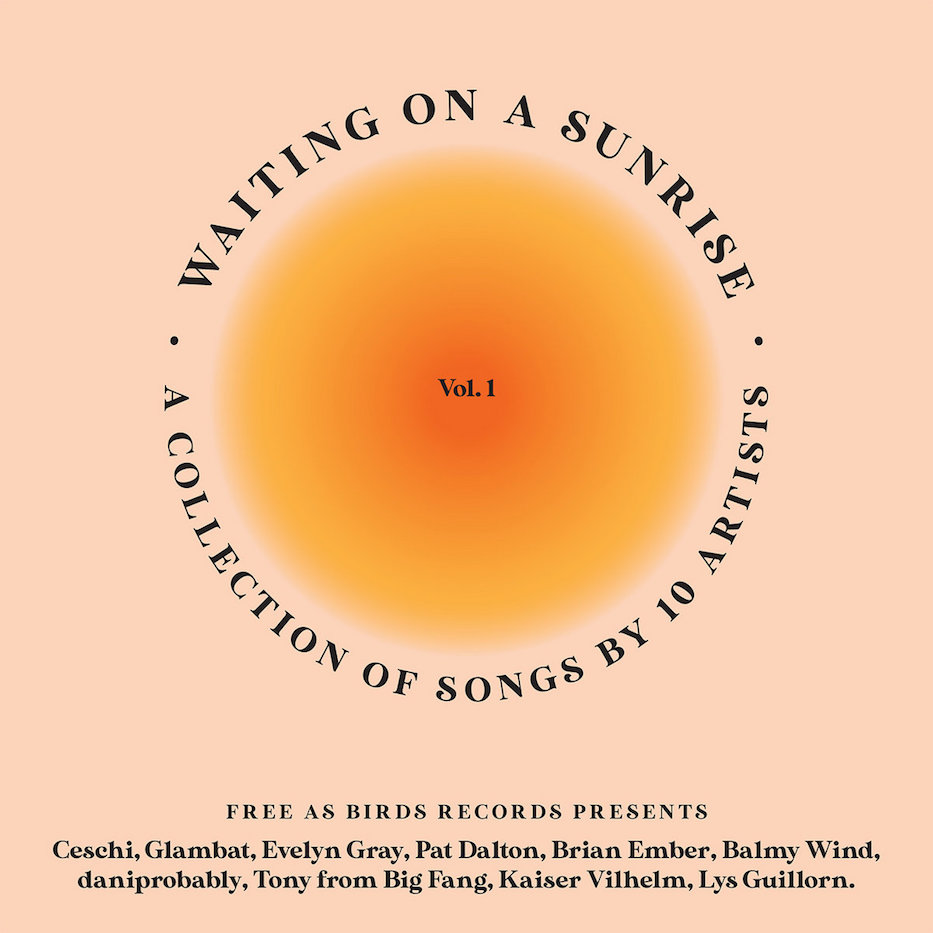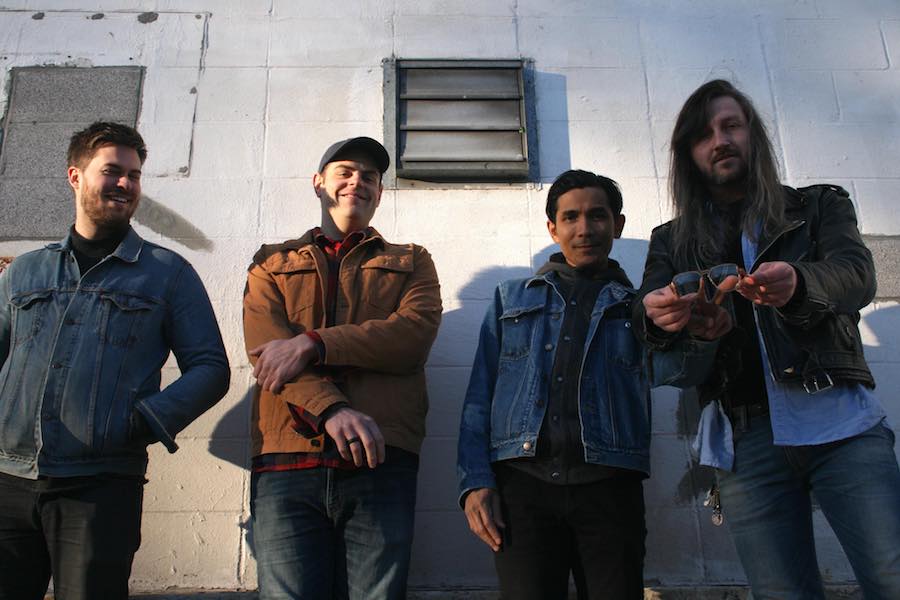
Music | Arts & Culture | COVID-19

Karli Hendrickson Album Artwork.
The song feels like you’ve walked right into an open field. There’s warbling flute, strings that fall on top of each other until they’re playing tag. But something isn’t quite right: under the musician’s voice there’s a low buzz, like a record scratch made by extraterrestrials.
“Wouldn’t it be nice to deceive myself into believing/That there was something larger than reason,” Ceschi sings. His voice is gentle but on edge, as if he has found a cluster of grape hyacinths in the middle of the apocalypse. “That spirits roam the earth/In their ghastly vessels.”
Ceschi and Deadpan Darling’s “These Days” sets the tone for Waiting On A Sunrise Vol. 1, the latest from musician and Free As Birds Records founder Alex Burnet. One month after releasing his own coronavirus-inspired EP, Burnet has dropped Waiting On A Sunrise as a way to give back to artists affected by the pandemic.
The album features artists Pat Dalton, Ceschi, Daniprobably, Tony Mascolo (of Big Fang), Lys Guillorn, Brian Ember, Gambat, Evelyn Gray, Kaiser Wilhelm, and Balmy Wind. It was mastered by Sam Carlson of Sans Serif Recording, with album art from Noank-based designer Karli Hendrickson.
Seventy-five percent of proceeds will go to artists featured on the album, and 25 percent will go back to the New Haven Creative Sector Relief Fund. Burnet was among 146 recipients in the first round of relief funding in late March, and said he feels it is his duty to give back to the creative community.
“My pitch was this: hey, I got this Arts Council grant, I really want to give back, you can send a track to it to this address to get mastered by this date,” he said in a phone interview Sunday. “This is kind of like, my dream job. I got to be the curator. I got to pick artists who I respect, who might need some help, not just financially but also emotionally.”
For Burnet, the album came out of his own experience dealing with coronavirus-mandated business closures and the financial uncertainty that has followed. On March 16, the musician walked into Next Door for his day job as a chef, and learned an hour later that the restaurant would be closing per state order.
Instead of leaving the restaurant, he sat down with his colleagues and started to file for unemployment. As others arrived for their shifts, they would get briefed on the situation, then sit down and start doing the same thing. By the afternoon, several of them sat at a table, talking each other through the application.
“It was pretty surreal,” he recalled.
He considers himself “very fortunate:” because he was one of the earliest applicants during what has become a COVID-19 crush, the payment came through. By the time the card had arrived three weeks later, he had made an EP and filed for a creative sector relief grant (“I was like, I want to help keep the music scene going, and I need to know that I can go grocery shopping too,” he joked). When the second grant came through, he started texting and calling friends to see if they could turn new work around in just a few weeks.

| Burnet (at far right) with Laundry Day members Sam Carlson, Jared Thompson, and Kuki Kooks. Monica Bunton Photo. |
“I got that EP done in a week, and I felt such power from it,” he said. “Like, the pandemic is happening, and I am fulfilling my destiny and making art. I wanted to give that feeling to other musicians.”
He also knew that the spring and early summer mark a specific time for musicians: the start of festival season, when the outdoors becomes warm enough to play together and bands jam for hours, sometimes days on end. Festivals are cancelled this year. Burnet, who is personally mourning the loss of The Thing In The Spring next month, figured this could be the next best thing.
“It’s this magnetic experience of making friends with a different band,” he said. “You’ve all got similar things, you become friends and you play at each other’s shows. And part of this compilation was that that isn't happening this year. What a crusher. So I thought, what’s a good way to put them together anyway?”
The more musicians he called, the more signed on to the project. While he worried initially “that I would only get, like, three songs,” everyone turned their work in on time. Several of them told him that isolation had been surprisingly good for their work. (At least one title, from Glambat’s Emily Rose Alderman, suggests the artist learned a new music production software while isolating.)
On the album, one gets a glimpse into that process: it is full of tight, new material that jumps between urgent and flowy, danceable and just a step away from unraveling in the best of ways. In Ceschi’s “These Days,” the opening gives way to syncopated beats, hand claps, succinct horn sounds and percussion that feels like an arrhythmic, alien heartbeat.
By the one minute mark, he’s fallen into a hypnotic rhythm, listing objects living and nonliving one by one (“to death/to the cancer that chews away at our stomachs/to art/to the wretched smell of loving…”). It is grim and also magical: his voice gets progressively more on edge, more laced with tired frustration.
Then he does that thing that pre-pandemic Ceschi would have done: he punches right through it, his voice shaking just so. He keeps going. He’s still here. We are too.
Waiting On A Sunrise Vol. 1 basks in its variety. In Daniprobably’s “Love U,” a listener can sink all the way into the vocals and feel a vibrating kind of calm, like that epsom bath they meant to take in March, and still haven’t gotten around to. It’s like being submerged in Alex Winston circa 2011, if Alex Winston lived in a lava lamp and was totally okay with it.
One song after it, and the listener is thrown right into rock and roll, propelled forward as Mascolo belts “don’t let me drown!” over fuzzy guitar. Guillorn picks up the baton minutes later, and gives a listener an intimate tour of everything around her. It’s confessional and candid, a peek into her life during this strange time.
“The last time that I drove to work/The weeping cherry trees were beginning to turn green along the highway,” she sings. Instantly, one is reminded that it’s been almost two months since most nonessential workers have reported to a physical space.
It’s as if someone has asked, “what did you do when writing about COVID-19,” with genuine interest in the result. Brian Ember gets slow and weird at just the right time, with a ballad so touched by physical distancing it makes a sort of perfect, sad waltz for one. There are vocals soaked in echo, funk and grief from Glambat and Evelyn Gray, a kicking penultimate number from Kaiser Wilhelm that leaves the listener dizzy before the final track.
Burnet, who named Free As Birds Records after a label he dreamed up in college, said he's excited to have the compilation—and that he's just getting started. Vol. 1 launched on May 1, because Bandcamp has waived commission fees for the first Friday of every month. Sunday, he said he is planning to do the same for Waiting On A Sunrise Vol. 2 in June, and Waiting On A Sunrise Vol. 3 in July. As of Monday, Vol. 1 had raised just over $500.
He added that he’s been riding the COVID-19 emotional wave—just as he guesses many around him are, too. The longer he has been unemployed, the more he has thought about how the economy “was so messed up” even before coronavirus-enforced closures began. Now, he’s more certain of the argument for universal basic income and Medicare for all as he’s ever been.
“There’s good days and there’s bad days,” he said. “There’s days when it’s hard to get off the couch and get anything done. Nothing’s going to get back to normal. You can break a vase and glue it back together, but it’s never quite the same.”
But, he added, his artistic output is good. After recording an EP, he wrote and recorded three more songs that he has for a forthcoming project. He’s working hard on the compilations. His unemployment benefits mean that he knows where his groceries are coming from, at least for the moment.
“I’m really just feeling blessed to have been given this opportunity,” he said. “I’m still writing every day. I started a label to put this album out. I’m going to use this moment, this very unique moment, this once in a lifetime moment, to own a label and be an artist.”

